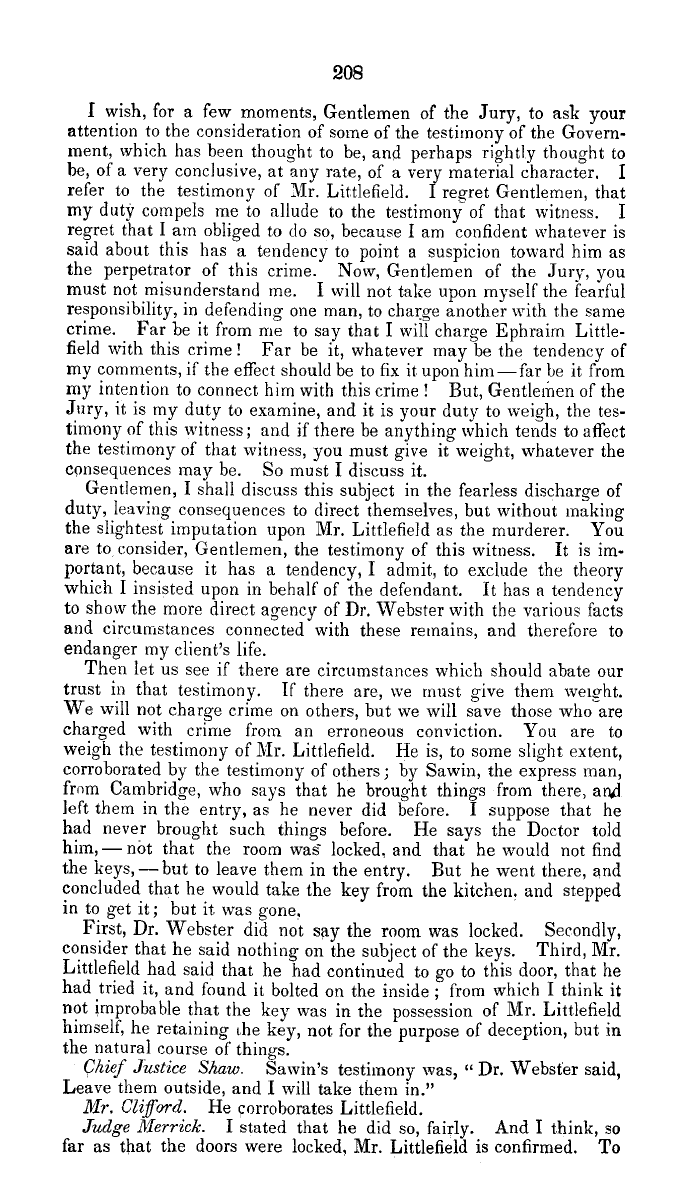|
208
I wish, for a few moments, Gentlemen of the Jury, to ask your
attention to the consideration of some of the testimony of the Govern-
ment, which has been thought to be, and perhaps rightly tbought to
be, of a very conclusive, at any rate, of a very material character. I
refer to the testimony of Mr. Littlefield. I regret Gentlemen, that
my duty compels me to allude to the testimony of that witness. I
regret that I am obliged to do so, because I am confident whatever is
said about this has a tendency to point a suspicion toward him as
the perpetrator of this crime. Now, Gentlemen of the Jury, you
must not misunderstand me. I will not take upon myself the fearful
responsibility, in defending one man, to charge another with the same
crime. Far be it from me to say that I will charge Ephraim Little-
field with this crime ! Far be it, whatever may be the tendency of
my comments, if the effect should be to fix it upon him-far be it from
my intention to connect him with this crime ! But, Gentlemen of the
Jury, it is my duty to examine, and it is your duty to weigh, the tes-
timony of this witness; and if there be anything which tends to affect
the testimony of that witness, you must give it weight, whatever the
consequences may be. So must I discuss it.
Gentlemen, I shall discuss this subject in the fearless discharge of
duty, leaving consequences to direct themselves, but without making
the slightest imputation upon Mr. Littlefield as the murderer. You
are to, consider, Gentlemen, the testimony of this witness. It is im-
portant, because it has a tendency, I admit, to exclude the theory
which I insisted upon in behalf of the defendant. It has a tendency
to show the more direct agency of Dr. Webster with the various facts
and circumstances connected with these remains, and therefore to
endanger my client's life.
Then let us see if there are circumstances which should abate our
trust in that testimony. If there are, we must give them weight.
We will not charge crime on others, but we will save those who are
charged with crime from an erroneous conviction. You are to
weigh the testimony of Mr. Littlefield. He is, to some slight extent,
corroborated by the testimony of others; by Sawin, the express man,
frnm Cambridge, who says that he brought things from there, aryl
left them in the entry, as he never did before. I suppose that he
had never brought such things before. He says the Doctor told
hirn,-not that the room wag locked. and that he would not find
the keys,-but to leave them in the entry. But he went there, and
concluded that he would take the key from the kitchen, and stepped
in to get it; but it was gone,
First, Dr. Webster did not say the room was locked. Secondly,
consider that he said nothing on the subject of the keys. Third, Mr.
Littlefield had said that he had continued to go to this door, that he
had tried it, and found it bolted on the inside ; from which I think it
not improbable that the key was in the possession of Mr. Littlefield
himself, he retaining the key, not for the purpose of deception, but in
the natural course of things.
Chief Justice Shaw. Sawin's testimony was, '° Dr. Webster said,
Leave them outside, and I will take them in."
Mr. Clifford. He corroborates Littlefield.
Judge lllerrick. I stated that he did so, fairly. And I think, so
far as that the doors were locked, Mr. Littlefield is confirmed. To
|

